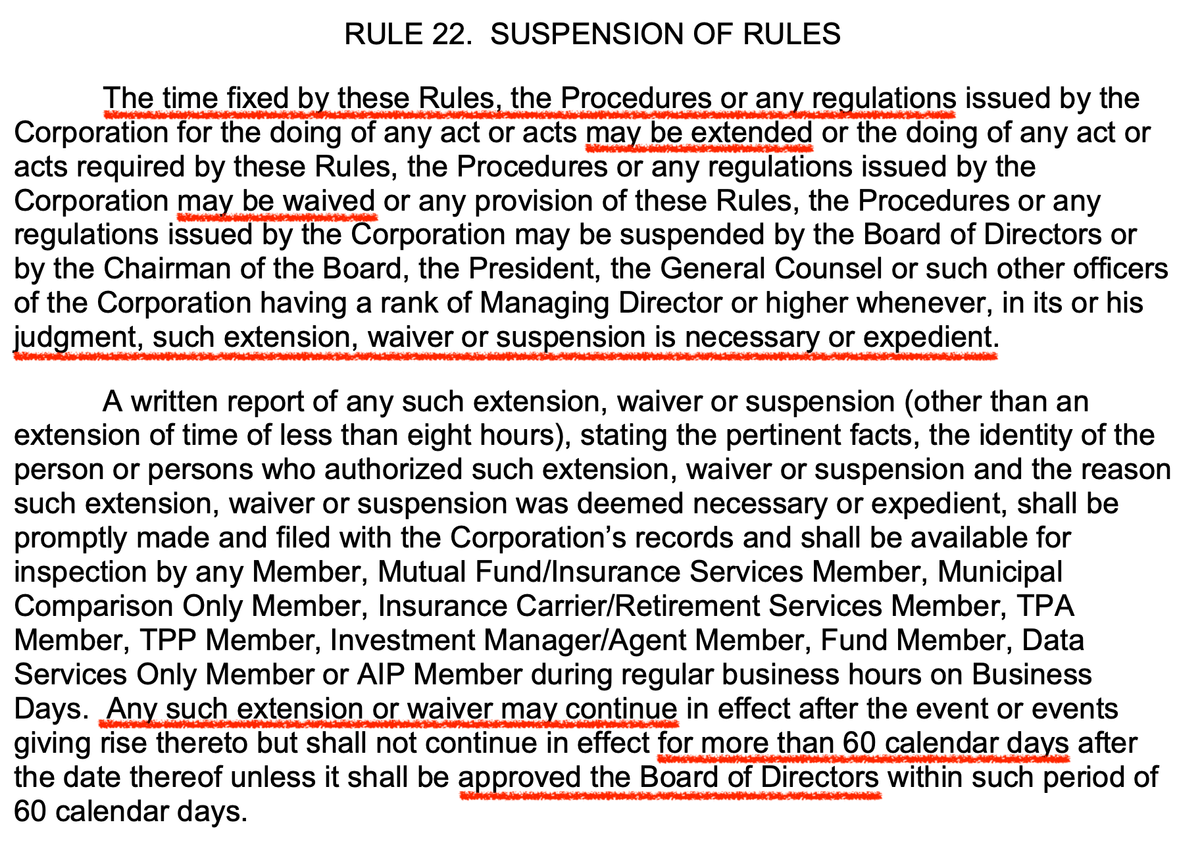The Antitrust Division of the United States Department of Justice on the Big 4: "The Division commends the Commission for its commitment to fostering competition in equities markets, which benefits both U.S. investors and the domestic economy".

Source: https://www.sec.gov/comments/s7-29-22/s72922-20164065-334011.pdf
INTRODUCTION:
- The Antitrust Division of the United States Department of Justice (“Antitrust Division”) appreciates this opportunity to share its views with the United States Securities and Exchange Commission (“Commission”) on the Commission’s four proposed rules relating to:
- The disclosure of order execution information (the “Rule 605 Proposal”).
- Setting minimum pricing increments, access fees, and transparency requirements (the “Regulation NMS Proposal”).
- Competition for certain orders (the “Order Competition Proposal”).
- Setting forth best execution requirements for certain market participants (the “Best Execution Proposal”), collectively, the “Proposed Rules”).
- The Division commends the Commission for its commitment to fostering competition in equities markets, which benefits both U.S. investors and the domestic economy, and for its openness to comments on the Proposed Rules.
THE ANTITRUST DIVISION’S INTEREST IN THE COMMISSION’S PROPOSED RULES:
- The Antitrust Division’s mission is to promote and protect competition, which is a core organizing principle of the American economy.
- Vigorous competition increases economic liberty, opportunity, and fairness for consumers and workers alike.
The Antitrust Division, along with the Federal Trade Commission, is entrusted with enforcing the federal antitrust laws, which prohibit certain business practices and transactions that have the potential to harm competition, consumers, workers, and other market participants.
- Additionally, to further its mission, the Antitrust Division engages in competition advocacy.
- This advocacy seeks to promote competition via comments on rulemakings and legislation, as well as court filings.
- The President’s Executive Order on Promoting Competition in the American Economy directs all federal agencies to consider concentration and competition in industries under their jurisdiction.
- Participants in the financial services industry benefit from competition, as Congress found when enacting section 11A of the Exchange Act.
- Recognizing the importance of efficient financial markets to the U.S. economy, the Antitrust Division has long sought to foster competition by sharing its views with the Commission via formal comments.
- Improving the quality of information available to market participants and updating trading formats and procedures not only promotes competition, but also promotes fair and efficient markets.
- The Antitrust Division recognizes the important role the Commission plays in protecting consumers and competition in securities markets and welcomes the opportunity to share its comments regarding the Proposed Rules with the Commission.
THE PROPOSED RULES:
- The Commission’s Proposed Rules intend to improve securities trading by improving the quality of information available to traders, increasing the granularity of trading data, and improving the quality of trades made by various market participants.
The Rule 605 Proposal:
- The Rule 605 Proposal: The Commission proposes updating the disclosures required for executed orders for NMS stocks.
- The proposal would expand the types of entities required to make available public reports describing the quality of their executed trades.
- In addition, the Commission proposes modifying the type of orders covered and the type of information included in those reports.
- By making these changes, the reports may provide market participants with more information about execution quality, and how the quality of trades may differ among firms.
The Regulation NMS Proposal:
- The Commission also proposes several changes to how Regulation NMS stocks are quoted and the requirements for accessing those quotes.
- First, the proposal suggests changing the minimum pricing increment (“tick size”) for Regulation NMS stocks, currently at $0.01, to allow sub-penny quotes, with the minimum allowable increment depending on the quoted spread for the stock.
- Second, the proposal seeks to lower the cap on fees that trading centers can charge for executing orders against certain types of quotations.
- Finally, the proposal updates definitions of “round lots” and “odd lots,” which are ways to categorize quantities of stocks when quoting prices.
- This proposal accelerates implementation of the round-lot and odd-lot updates that were included in the final, but yet-to-be-implemented, Market Data Infrastructure Rule (“MDI Rule”).
- The current proposed rule provides for a shorter implementation period than the MDI Rule.
The Order Competition Rule Proposal:
- The Commission’s proposal to add an Order Competition Rule is designed to protect the interests of individual investors trading NMS stocks.
- This proposed rule would designate certain stock orders placed by individual investors as “segmented orders.” Under the rule, these orders, over 90% of which are currently executed via wholesalers instead of on an exchange, would be subject to a competitive auction process.
The Regulation Best Execution Proposal:
- Although FINRA and MSRB rules set out a duty of best execution for broker-dealers, this duty is not currently addressed by specific Commission rules or standards.
- The Commission’s proposed Regulation Best Execution seeks to remedy that void.
The proposed rule would:
- (1) identify specific factors that broker-dealers must address in their policies and procedures on best execution.
- (2) set out additional requirements for “conflicted transactions.
- (3) create review and reporting requirements.20 Conflicted transactions are those in which a broker-dealer executes a client’s order as principal, routes an order to an affiliate for execution, or receives (or provides payment for) order flow involving that client’s order.
- Under the proposed Regulation Best Execution, broker-dealers would have to implement additional policies and procedures to address how the broker-dealers will obtain best execution for their clients with respect to these conflicted transactions.
COMPETITION ISSUES RAISED BY THE PROPOSALS:
- The Antitrust Division commends the Commission for its work. In particular, the Antitrust Division is heartened to see that the Commission is seeking to “promote competition as a means to protect the interests of individual investors and to further the objectives of [a national market system]
Protecting competition means keeping up with market realities:
- The Proposed Rules update regulations that, in many cases, date from 2005 or earlier.
- As a general matter, the Antitrust Division agrees with the Commission that such updating is important because effective agency action must reflect the realities of current markets, rather than those of an earlier time.
Markets have changed in significant ways in the last decades.
- For example, when the $0.01 minimum tick size was adopted in 2005, equities markets were still largely using manual, in-person trading on exchange floors.
- Technological advances now allow many NMS stocks to be priced using increments smaller than $0.01, such that “based on liquidity and price competition, these stocks could be priced more aggressively within the spread than is possible with the current pricing increment of $0.01.”
Given the market’s ability to support tick sizes smaller than $0.01, the Commission believes that smaller minimum pricing increments will “facilitate fair competition and equal regulation that would help market forces to determine the prices of NMS stocks.”
- For example, these smaller tick sizes could allow exchanges to compete more effectively for order flow, since the smaller tick sizes would more closely match the pricing increments used by off-exchange trading platforms.
Smaller tick sizes could also de-emphasize the role of speed as a way for trading firms to win orders, since firms submitting orders to exchanges would be able to compete for trades by submitting more attractive bids or offers at the smaller tick levels rather than racing to the front of the queue with an identically-priced bid or ask price.
- This would allow slower traders to more effectively compete against high-speed traders for trading volume.
- Similarly, the proposed Order Competition Rule requires that the auction process for segmented orders to take place in time frames that would be unthinkable during the era of floor trading.
- These auctions would allow a variety of market participants to compete for an order instead of the order going to a wholesaler that executes the order in isolation.
- Just as the Antitrust Division believes that it is important to “update [its] tools to meet the facts, not try to contort the facts to fit out of date tools,” we applaud the Commission for seeking to update its regulations to match current market realities.
The Commission should account for potential interactions between the Proposed Rules:
- The number of changes contemplated by the Proposed Rules means that there are a number of ways in which these rules could interact with one another.
The Antitrust Division encourages the Commission to carefully consider potential interactions among the Proposed Rules when preparing their final versions, planning for the rules’ implementation timelines, and evaluating the actual effects of the rules once they go into effect. In particular, the Antitrust Division urges the Commission to ensure that the final rules, taken together, preserve the benefits to competition identified by the Commission in each of the rules’ proposals.
- For example, the smaller proposed pricing increments in the Regulation NMS proposal could narrow the price differential between trades executed by a wholesaler compared to that trade if it were executed on an exchange, increasing the ability of exchanges to compete against wholesalers for orders.
- This in turn could affect how many orders brokers send to wholesalers, and therefore would be subject to the proposed Order Competition Rule.
- Similarly, the Commission believes that, as part of complying with the proposed Regulation Best Execution, “broker-dealers should generally consider including the level of competition of a market as an element of its best execution policies and procedures.”
- Should both the proposed Regulation Best Execution and Order Competition Rule be adopted, broker’s best execution policies and procedures will have to take into account auctions conducted pursuant to the Order Competition Rule and consider the competitive dynamics of those auctions compared to other ways to execute clients’ orders.
The Commission should consider changes in competition due to the implementation of the Market Data Infrastructure Rule:
- In addition to the Proposed Rules discussed in this Comment, the Commission should consider the effects of the MDI Rule when finalizing and implementing the Proposed Rules.
- The MDI Rule will change how trading data is distributed, including the level of detail contained in the data feed(s), the frequency those data fields are updated, and the prices for the feeds.
- The MDI Rule also changes who collects these data feeds and how they are distributed to market participants.
- As of the date of this Comment, the implementation period for the MDI Rule is yet to begin and the effects of the MDI Rule on equities trading are uncertain.
- While the Commission has anticipated that the MDI Rule will result in certain changes, such as narrower NBBO spreads for certain stocks, whether the anticipated effects will come to pass or not, and the magnitude of those effects, will be uncertain until the new scheme is actually implemented.
- If the MDI Rule’s mandated changes in “core data” feeds alter trading behavior of the feeds’ users (e.g., such as whether firms that take advantage of the MDI Rule’s more detailed core data will be more or less likely to participate in auctions for retail orders under the Order Competition Rule), finalizing and implementing the Proposed Rules may lead to overall effects on competition— either in magnitude or in kind—that differ from those the Commission initially contemplated. These issues should be carefully considered as the rulemaking process proceeds.

TLDRS:
Ken Griffin may have all of 'Industry' on his side but it looks like Gary Gensler has DOJ on his side for the 'Big 4'?
Reddit post from LWKD with Dave's tweet about this here if you would like to view more discussion on this topic.



